5 books about Penance
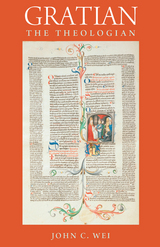
Gratian the Theologian
John C. Wei
Catholic University of America Press, 2016
Gratian the Theologian shows how one of the best-known canonists of the medieval period was also an accomplished theologian. Well into the twelfth century, compilations of Church law often dealt with theological issues. Gratian's Concordia discordantium canonum or Decretum, which was originally compiled around 1140, was no exception, and so Wei claims in this provocative book. The Decretum is the fundamental canon law work of the twelfth century, which served as both the standard textbook of canon law in the medieval schools and an authoritative law book in ecclesiastical and secular courts. Yet theology features prominently throughout the Decretum, both for its own sake and for its connection to canon law and canonistic jurisprudence.
[more]
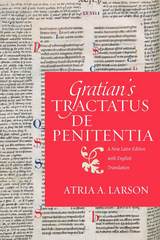
Gratian's Tractatus de penitentia
Atria A. Larson
Catholic University of America Press, 2016
Gratian's Decretum is one of the major works in European history, a text that in many ways launched the field of canon law. In this new volume, Atria Larson presents to students and scholars alike a critical edition of De penitentia (Decretum C.33 q.3), the foundational text on penance, both for canon law and for theology, of the twelfth century. This edition takes into account recent manuscript discoveries and research into the various recensions of Gratian's text and proposes a model for how a future critical edition of the entire Decretum could be formatted by offering a facing-page English translation. This translation is the first of this section of Gratian's De penitentia into any modern language and makes the text accessible to a wider audience. Both the Latin and the English text are presented in a way to make clear the development of Gratian's text in various stages within two main recensions. The edition and translation are preceded by an introduction relating the latest scholarship on Gratian and his text and are followed by three appendices, including one that provides a transcription of the relevant text from the debated manuscript Sankt Gallen, Stiftsbibliothek 673, and one that lists possible formal sources and related contemporary texts. This book provides a full edition and translation of the text studied in depth in Master of Penance: Gratian and the Development of Penitential Thought and Law in the Twelfth Century (CUA Press, 2014) by the same author.
[more]
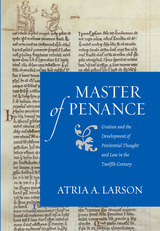
Master of Penance
Arrai A. Larson
Catholic University of America Press, 2014
This book presents the first full-scale study of the Tractatus de penitentia (C.33 q.3) in Gratian's Decretum, which became the textbook for canon law and served as the basis of the church's developing jurisprudence, in theory and in practice
[more]
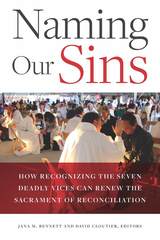
Naming Our Sins
How Recognizing the Seven Deadly Vices can Renew the Sacrament of Reconciliation
Jana Bennett
Catholic University of America Press, 2019
What would it take to renew our ability to name our sins in a meaningful and pertinent way? Naming sins is a particularly important task for Catholic moral theology, but it is one that often falls back into a paradigm of simple violations of rules. While laws and commandments are essential, Vatican II’s universal call to holiness and the revival of virtue ethics require moving further. Yet in part because moral theologians today tend to be lay people, not priests, there has been a de-emphasis on the confession of sins. Contemporary questions like poverty, racism, and abortion are usually connected to questions about sin in some way, but they are disconnected from the idea of naming specific sins in the sacrament of penance. Lay moral theologians raise these issues in a way that makes clear their implications for a parish social justice committee (or the voting booth), but not their implications for the naming of sins in the sacrament of reconciliation. Naming Our Sins proposes to re-make that connection: the moral theologian’s task of helping people name individual sins needs to be restored, though in ways distinctive from dominant pre-Vatican II notions.
In this volume, editors Jana Bennett and David Cloutier gather some of the best of the current generation of moral theologians in order to reflect on the classic tradition of the vices. It is crucial to the Christian understanding of sin that we recognize (a) we bear at least some responsibilities for injuries, and (b) God wants us to participate in the process of healing and conversion. Neither the sin itself nor the healing simply come from somewhere else; the task of naming sins enlists us as mature, growing disciples.
Each chapter takes on a different classical vice, describing the vice, exploring its dimensions in contemporary experience, and moving the reader toward naming specific sins that arise from the vice. The concluding chapters from Catholic priests explore two basic dimensions of the sacrament of penance: liturgical and communal.
[more]
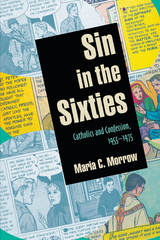
Sin in the Sixties
Maria C. Morrow
Catholic University of America Press, 2016
Confession reached its peak attendance in the early 1950s, but by the end of the Second Vatican Council, the popularity of the sacrament plummeted. While this decline is often noted by historians, theologians, priests, and laity alike - all eager to provide possible explanations - little attention has been paid to another dramatic shift. Coincident with the decreasing popularity of the sacrament of penance in the United States were changes to non-sacramental penitential practices, including Lenten fasting, Ember Days, and the year-round Friday meat abstinence. American Catholics - sometimes derisively called Fisheaters - had assiduously observed Friday abstinence, regardless of ethnicity or geographic location.
[more]
READERS
Browse our collection.
PUBLISHERS
See BiblioVault's publisher services.
STUDENT SERVICES
Files for college accessibility offices.
UChicago Accessibility Resources
home | accessibility | search | about | contact us
BiblioVault ® 2001 - 2024
The University of Chicago Press









